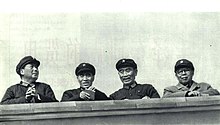
Back تشن بودا Arabic تشن بودا ARZ Chen Boda Catalan Čchen Po-ta Czech Chen Boda German Ĉen Boda Esperanto Chen Boda Spanish چن بودا Persian Chen Boda Finnish Chen Boda French
Chen Boda | |
|---|---|
| 陈伯达 | |
 Left to right: Mao Zedong, Lin Biao, Zhou Enlai and Chen Boda during the Cultural Revolution in Beijing, 1966. | |
| Member of the Politburo Standing Committee of the Chinese Communist Party | |
| In office 1966–1970 | |
| Personal details | |
| Born | Chen Shangyu 29 July 1904 Hui'an, Fujian, Qing China |
| Died | 20 September 1989 (aged 85) Beijing, China |
| Political party | Chinese Communist Party (1927–1973) |
| Children | 4[1] |
| Alma mater | Sun Yat-sen University |
| Chen Boda | |||||||||||||
|---|---|---|---|---|---|---|---|---|---|---|---|---|---|
| Traditional Chinese | 陳伯達 | ||||||||||||
| Simplified Chinese | 陈伯达 | ||||||||||||
| |||||||||||||
| Part of a series on |
| Maoism |
|---|
 |
Chen Boda (simplified Chinese: 陈伯达; traditional Chinese: 陳伯達; Wade–Giles: Ch'en Po-ta; Pe̍h-ōe-jī: Tân Peh-ta̍t; 29 July 1904 – 20 September 1989), was a Chinese Communist journalist, professor and political theorist who rose to power as the chief interpreter of Maoism (or "Mao Zedong Thought") in the first 20 years of the People's Republic of China.[2] Chen became a close associate of Mao Zedong in Yan'an, during the late 1930s, drafting speeches and theoretical essays and directing propaganda.[3]
After 1949, Chen played a leading role in overseeing mass media and ideology; at the start of the Cultural Revolution in 1966, Mao named him Chairman of the Cultural Revolution Group, entrusting him with the task of guiding the new mass movement. However, his ultra-radical line and close ties with Lin Biao eventually led to his downfall in 1970.[2][3]
- ^ yidianzixun.com
- ^ a b Chen Boda biography Britannica Concise Encyclopedia
- ^ a b Guo Jian, Yongyi Song and Yuan Zhou, "Historical Dictionary of the Chinese Cultural Revolution", pp. 33-35, The Scarecrow Press, 2006